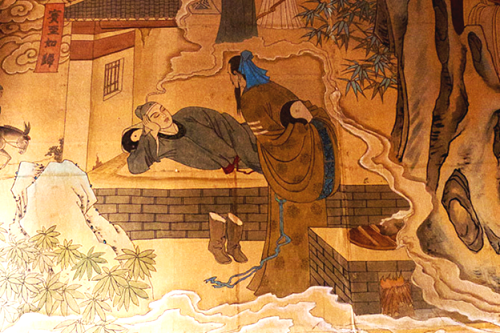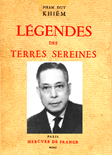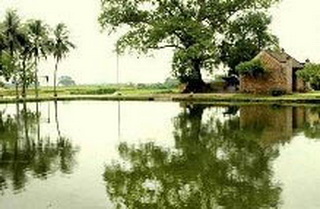Le Songe de Nam Kha (The Dream of Nam Kha)

Le Songe de Nam Kha (1) ou La Bouillie de Millet
By Phạm Duy Khiêm (2) in Legendes des terres sereines (3)
C'était la troisième fois que Lu Sinh (4), échouait au concours triennal.
La malchance ne cessait de le poursuivre, tandis que d'autres étudiants, moins doués et moins savants, étaient plus heureux.
Tristement, Lu Sinh quitta la capitale pour rentrer dans son village, à pied, son léger ballot au bout d'un bâton.
En traversant la région de Nam Kha, il fut surpris par une averse dans la montagne. Il grimpa vers une grotte pour s'y réfugier.
C'était la demeure d'un vieux taoiste.
L'ermite le fit s'asseoir sur l'unique meuble de la grotte : un lit de pierre lisse. Tout en continuant à surveiller la cuisson d'une marmite de millet, il s'informa aimablement du chemin qui restait à Lu Sinh. Celui-ci se mit à lui confier ses échecs, son intention de recommencer, ses espoirs et ses ambitions. L'ermite l'écouta en silence, puis l'invita à s'allonger sur le lit pour se reposer, avant de continuer son voyage.
Trois ans après, Lu Sinh fut reçu premier docteur de l'Empire. Ce fut, du jour au lendemain, la gloire.
D'abord la série des rites inoubliables : proclamation du nom par le héraut, de son porte-voix de cuivre éclatant, devant la foule assemblée ; remise solennelle du costume de cour par un grand mandarin ; procession sur un cheval blanc à travers la capitale, puis jusqu'au village, où, pendant plusieurs jours, fêtes et réjouissances se déroulèrent sans interruption.
Suivirent l'exercice des hautes fonctions publiques, le mariage avec une princesse, la plus jolie des filles de l'Empereur, puis, en quelques années, la naissance de beaux enfants, l'élévation au grade de premier ministre... Très rapidement arrivé au faîte de la richesse et des honneurs, Lu Sinh s'y maintint durant quinze ans.
Survint une invasion des Barbares.
Les premières batailles furent désastreuses pour l'Empereur. Appelé au commandement suprême, Lu Sinh réussit à repousser les Barbares, envahit leur pays à son tour, tua leur roi. Mais le charme sauvage de la reine le captiva et le retint auprès d'elle : emporté par une passion irrésistible, il oublia complètement sa femme, son foyer, ses devoirs envers son roi et envers son pays.
En vain, l'Empereur le rappela ; il dut se résoudre à envoyer une expédition contre lui. Lu Sinh s'insurgea, voulut résister par la force, mais ses propres lieutenants le trahirent et le livrèrent.
Malgré les larmes de sa femme, il fut condamné à mort par l'Empereur.
La nuit qui précéda le supplice, Lu Sinh la passa à se remémorer sa vie entière : sa pauvre enfance, ses labeurs d'étudiant, l'éclatante ascension, le bonheur, puis la passion enivrante et l'égarement, et la chute soudaine...
Lu Sinh ouvrit les yeux : il était dans la grotte, couché sur le lit de pierre ; près de lui, accroupi à terre, le vieillard remuait lentement sa bouillie de millet. Seul le léger bruit de sa baguette sur le fond de la marmite, à peine plus perceptible que le chant du feu, troublait le silence de la montagne. La pluie avait cessé.
''Jeune homme, dit l'ermite, vous avez fait un long rêve, mais ma bouillie n'est pas cuite. Donnez-moi encore un instant, et vous me ferez le plaisir de partager mon modeste repas.''
Phạm Duy Khiêm
The Dream of Nam Kha (1)
( The Millet Porridge)
It was the third time that Lu Sinh (4) failed the triennial competition (for the selection of mandarins).
Bad luck continued to haunt him, while other students, less gifted and less learned, were more fortunate.
Sadly, Lu Sinh left the capital to return to his village on foot, his light bundle on the end of a stick.
While crossing the Nam Kha region, he was surprised by a downpour in the mountain. He climbed to a cave to take refuge there.
It was the home of an old Taoist.
The hermit made him sit down on the only piece of furniture in the cave: a bed of smooth stone. While continuing to watch the cooking of a pot of millet, he kindly inquired about what was left for Lu Sinh. The latter began to confide in him his failures, his intention to start over, his hopes and his ambitions. The hermit listened to him in silence, then invited him to lie down on the bed to rest, before continuing his journey.
Three years later, Lu Sinh was received as First Doctor of the Empire (5). Overnight, it was glory.
First the series of unforgettable rites: proclamation of his name by the herald with his shining brass megaphone, in front of the assembled crowd; solemn presentation of the court costume by a great mandarin; procession on a white horse through the capital, then to his village, where, for several days, festivities and entertainments took place without interruption.
Then followed the exercise of high public functions, marriage to a princess, the prettiest of the Emperor's daughters, then, in a few years, the birth of beautiful children, the rise to the rank of prime minister … Luu Sinh very quickly reached the peak of wealth and honors, and stayed there for fifteen years.
Then came an invasion by barbarians.
The first battles were disastrous for the Emperor. Called to the supreme command, Lu Sinh succeeded in pushing back the Barbarians, invaded their country in turn, and killed their king. But their queen's wild charm captivated him and kept him close to her: carried away by an irresistible passion, he completely forgot his wife, his home, his duties towards his king and towards his country.
The Emperor unsuccessfully tried to recall him; he had to resolve to send an expedition against him. Lu Sinh rebelled, wanted to resist by force, but his own lieutenants betrayed him and handed him over.
Despite his wife's tears, he was condemned to death by the Emperor.
The night before the ordeal, Lu Sinh spent it remembering his entire life: his poor childhood, his labors as a student, his dazzling rise, his happiness, then his intoxicating passion and bewilderment, and his sudden fall. ..
Lu Sinh opened his eyes: he was in the cave, lying on the stone bed; near him, squatting on the ground, the old man slowly stirred his millet porridge. Only the slight sound of his wand grating the bottom of the pot, hardly more perceptible than the song of the fire, disturbed the silence of the mountain. The rain had stopped.
Young man, said the hermit, you have had a long dream, but my porridge is not cooked yet. Wait just one moment, and you will give me the pleasure of sharing my modest meal. ''
Translated by Hien V. Ho
Notes and references:
- This very popular legend comes from a Tang dynasty Chinese chuanqi (a form of short story) by Li Gongzuo (Lý Công Tá) , set in the year 794, titled “Nánkē Tàishǒu Zhuàn” (南柯太守传, “Nam Kha Thái Thú Truyện” or “Story of the Governor of the Southern Branch Commandery”).
Chunyu Fen (淳于棼; Thuần Vu Phần) is a previously successful and rich officer in the Huainan army who has offended his general and has been dismissed. Disgruntled, he drank himself to sleep under a huge ash tree (cây hoè) and was carried back to his house by two friends. While he is resting in a half-asleep state, a pair of messengers enter with an invitation from the king of "Hui An" (Hoè An).
Chunyu goes with the messengers in their carriage, which heads towards the ash tree and into the hollow under it. The scenery in the hollow, while consisting of mountains and rivers, looks different from the world above. After about ten miles, they enter a large city though a grand gate over which is written "The Great Kingdom of Ashendon"(Kingdom of the ash tree). Chunyu sees an old drinking friend of his at the side of the road, amongst other officers.
Chunyu is informed by the prime minister that the king has invited him here with the hope of him marrying one of his daughters, creating an alliance. When brought before the king, he is told that this is at his father's wish. Forthwith, he is married to the king's second daughter, a girl of about fifteen. Chunyu and his wife come to love each other greatly, and his power grows. At his wife's request, Chunyu takes an official post at Nanke (a prosperous and fertile southern tributary state) (Nam Kha or Southern Branch) where he serves as governor. Chunyu is a wise governor and the state flourishes. He has five sons, who all take official posts, and two daughters who are married into the royal family.
One day, the neighboring kingdom of "Sandalvine" invades, and Chunyu is commanded to raise an army and fight them, which he does, putting his friend Zhou in charge of 30,000 men. However, Zhou proves a poor commander, and the battle is a rout. Zhou flees back to Nanke under cover of darkness, where Chunyu arrests him, but the king pardons both men for the defeat. The next month Zhou dies from a boil on his neck and Chunyu's wife dies shortly after that. Chunyu's request to travel back to the capital with the hearse is granted, and he is greeted there by the mourning king and queen. After his return Chunyu behaves oddly and gathers so many followers that the king begins to suspect him. Meanwhile, the king is informed of a mysterious portent that the kingdom will be destroyed by an event caused by a foreigner close to the royal family. Accordingly, the king forces Chunyu to retire.
Sensing Chunyu's feelings of despondence, the king informs him that is regretful that his wife has died so young, but now Chunyu must return home. Chunyu argues, saying that this is his home, but the king disagrees, saying that Chunyu came from the world of men. So, Chunyu returns the way he came, but this time in an old and shabby carriage. Entering his home again, he is gripped by sadness, and then is shocked to see himself lying in his bed. Suddenly he awakens, and finds that the day he fell asleep has not yet ended, despite having lived a generation in Ashendon.
He goes out with his friends and uncovers a great ants' nest under the ash tree, with two huge ants attended to by the others, with another nest nearby for Nanke , under a branch that pointed to the South (hence the Vietnamese name Nam Kha, “kha” meaning “branch” in Sinitic Vietnamese), and a burial mound for his wife. A connected nest is found under a sandalwood tree overgrown with vines, showing where the invaders (Sandalvine) had come from. Chunyu forbids his friends to damage the nests and covers them again with the vines, but that night a severe storm destroys Ashendon, fulfilling the prophecy of destruction. Realising the emptiness of the material world, Chunyu becomes a Taoist, eschews money and women, and dies three years later. (Story adapted from Wikipedia/English)
A Japanese tale “The Dream of Akinosuke” tells the story of a farmer who has similar dreams while sleeping under a cedar tree. His soul , under the form of a yellow butterfly is grabbed by an ant and taken under the tree. All the events of his dream, his marriage to a princess, the birth of his seven children, his idyllic life on an island, his wife’s death, all actually happened inside the ant nest, until the moment when the yellow butterfly exits the tree and he wakes up.
In literary classic Vietnamese, sleep was frequently referred to as “"giấc điệp" (a butterfly experience), a reference to a legend about Chuang Tsu.
Chuang Tzu was a philosopher in ancient China, who, one night went to sleep and dreamed that he was a butterfly. He dreamt that he was flying around from flower to flower and while he was dreaming he felt free, blown about by the breeze hither and thither. He was quite sure that he was a butterfly. But when he awoke he realised that he had just been dreaming, and that he was really Chuang Tzu dreaming he was a butterfly. But then Chuang Tzu asked himself the following question: "Was I Chuang Tzu dreaming I was a butterfly or am I now really a butterfly dreaming that I am Chuang Tzu?".
The Vietnamese allegories for sleep: “giấc hòe” (ash tree sleep), “hoàng lương” (“yellow grain” or millet), giấc kê vàng (yellow millet sleep) refer to the ash tree and the millet porridge (usually reserved for the poor who could not afford wheat) in this Nam Kha dream story:
“Tiếng sen khẽ động giấc hòe.”
“Hoàng lương chợt tỉnh hồn mai”
(Nguyễn Du)
The concept of a lifetime being lived in the space of a single dream was explored in the Star Trek: The Next Generation episode "The Inner Light", where Picard wakes up on an alien planet and lives a long life before waking up after only a few minutes back in the real world. (Adapted from the Governor of Nan Ke in Wikipedia).
- The author, Phạm Duy Khiêm (born April 24, 1908 in Hanoi – died December 2, 1974, Montreuil-le-Henri, France)) was a Vietnamese writer, academic and South Vietnam ambassador in France. He was the son of the writer Phạm Duy Tốn, and brother of famous songwriter Phạm Duy.
He attended the French Lycee Albert Sarraut in Hanoi and was the first Vietnamese to obtain a French  Baccalaureat in classic studies (the baccalaureat was a rare achievement in the 1920’s). He was awarded a scholarship to study in France. He attended a very selective preparatory school, the lycée Louis-le-Grand, then was accepted into one of the most selective and prestigious graduate schools in Paris, l’ École normale supérieure. His circle at lycée Louis-le-Grand included poet Léopold Sédar Senghor (“African socialist” poet who would be elected to the prestigious Académie française and become the President of Senegal 1960-1980) and Georges Pompidou (President of France 1969-1974).
Baccalaureat in classic studies (the baccalaureat was a rare achievement in the 1920’s). He was awarded a scholarship to study in France. He attended a very selective preparatory school, the lycée Louis-le-Grand, then was accepted into one of the most selective and prestigious graduate schools in Paris, l’ École normale supérieure. His circle at lycée Louis-le-Grand included poet Léopold Sédar Senghor (“African socialist” poet who would be elected to the prestigious Académie française and become the President of Senegal 1960-1980) and Georges Pompidou (President of France 1969-1974).
He passed the Agrégation de Grammaire exam and again was the first Vietnamese to do so. ( According to Wikipedia, “agregation” exams are higher-level French competitive examinations held to recruit, in principle, senior secondary school teachers – though many of its laureates are in fact university teachers, whether lecturers or professors. The Agrégation examination is national in scope and is thus not tied to any particular university or institution. Laureates, called agrégés (in this case agrégés de Grammaire), become civil servants, like other teachers within the Ministère de l'Éducation nationale. Being an agrégé is a de facto condition for doctors who want to get tenure as university lecturers (maîtres de conférence). (“Thạc sĩ” in Vietnamese, but not to be confused with “thạc sĩ” in current Vietnamese system where it means a masters’ degree)
In 1935, Phạm Duy Khiêm returned home in Vietnam to work as a teacher at the most prestigious Vietnamese high school in Hanoi, Lycée du Protectorat (Trường Trung học Bảo hộ or “Trường Bưởi”), then at the French Albert Sarraut High School. From September 1939 to June 1940, he joined the French resistance against Nazi Germany, but was discharged from the army after Marechal Philippe Pétain made peace with Germany. Pham Duy Khiem returned to Vietnam, continuing to teach and write. In 1950, shortly after his mother’s death, he left Vietnam to live in France.
He won the Prix Louis Barthou of the Académie française for the autobiographical novel “Nam et Sylvie” (1942) under the pseudonym Nam Kim, then the Prix Littéraire d'Indochine in 1943 for a collection of Vietnamese tales ‘Légendes des terres sereines” (Legends of the Serene Lands; “sereine” being a literal translation of “an” as in An-Nam, the name of the country during French colonial times) where the above translated story comes from.
He was awarded an honorary PhD from the University of Toulouse in 1957.
He was briefly ambassador to France for the Ngô Đình Diệm government 1954–1957, but turned down a second appointment as ambassador to UNESCO because of he refused to support President Diệm's policies.
He stayed in France from 1958 onwards, and earned his living by giving speeches, tutoring, copy editing and reviewing books. Falling into a deep depression, he persisted in Confucian rigidity and his pride prevented him from asking for help from his family and friends.
He committed suicide on 2 December 1974 at his home in Montreuil-le-Henri, Sarthe, near Paris. In his youth, he had said "one must justify his existence on this earth" (il faut justifier sa présence sur cette terre). Somehow, his tragic death reminds us of the famous verses by 18th century poet Ôn Như Hầu Nguyễn Gia Thiều:
Giấc Nam Kha khéo bất bình,
Bừng con mắt dậy, thấy mình tay không.
(The Nam Kha dream is so unsettling,
One wakes up, open his eyes and finds oneself empty-handed.)
His works included:
Việt Nam văn phạm (Vietnamese Grammar, with Trần Trọng Kim, Bùi Kỷ, 1941)
De Hanoi à la Courtine (1941)
De la Courtine à Vichy (1942)
Mélanges (1942)
Légendes des Terres Sereines (1942)
La Jeune femme de Nam Xuong (1944)
Nam et Sylvie (1957, an autobiographical novel)
La place d'un homme (1958)
Ma mère (posthumous)
3) A book review in France at the time of its publication appreciated its originality and the values it brought to French literature: “Published in 1951, Légendes des terres sereines is a collection of tales that the peasants tell themselves, or that times lock up with their secrets. Regarding this book, which obtained a very warm and laudatory reception from the French press and the public, Paul Guth wrote: ‘We never tire of thanking our brother Pham duy Khiêm for bringing us in this century of ruins, the firmness of a great soul and a masterpiece that enriches our two heritages.’ ”
This excerpt from Legendes des terres sereines is found here (a website dedicated to his famous musician brother Pham Duy):
4) In a variant of this story, the protagonist’s name is a Confucian scholar named ‘Lu”, hence Lu Sinh (Student Lu).
“Đời nhà Đường có một nho sinh họ Lữ đi thi không đỗ. Trở về, dọc đường, vừa buồn lại vừa đói nên ghé vào một ngôi chùa con bên cạnh khu rừng, xin đỡ lòng. Chùa nghèo, nhà sư nấu kê thay gạo đãi khách.
Vì mệt mỏi nên họ Lữ nằm một lúc thì ngủ khò. Chàng thấy mình đã thi đỗ, được quan chức cao, nhà vua lại còn gả công chúa, phong cho chàng làm phò mã và cho đi trấn nhậm một nơi. Thật là vinh quang phú quý, không ai bằng. Nhưng khi đi đến nửa đường thì bỗng gặp quân giặc đỗ đến đánh. Lữ chống cự không lại. Lính hộ vệ bị giết. Xe kiệu bị đập phá tan tành. Chúng thộp cổ cả vợ chồng Lữ, đưa gươm kề họng... Lữ hoảng hốt, kêu lên một tiếng, giựt mình thức dậy mới biết là chiêm bao.”
5) Trạng nguyên
Hien V. Ho
November 24, 2020






